人教版八年级下第一单元知识点总结
最全面人教版八年级下册英语第一单元知识点归纳总结

Unit 1 What's the matter?一、词汇与短语◆重点单词A部分1.matter n. 问题;事情2.sore adj. 疼痛的;酸痛的3.stomachache n. 胃痛;腹痛4.foot n. 脚;足5.neck n. 颈;脖子6.stomach n. 胃;腹部7.throat n. 咽喉;喉咙8.hurt v. (使)疼痛;受伤9.fever n. 发烧10.passenger n. 乘客;旅客11.lie v. 躺;平躺12.break n. 间歇;休息13.rest v. &n. 放松;休息14.onto prep. 向;朝15.X-ray n. X射线;X光16.trouble n. 问题;苦恼17.toothache n. 牙痛18.hit n. (用手或器具)击;打19.headache n. 头痛20.herself pron. (she的反身代词)她自己21.off adv. & prep. 离开(某处);不工作;从……去掉B部分1.bandage n. 绷带v. 用绷带包扎2.press v. 压;挤;按3.sick adj. 生病的;有病的4.knee n. 膝;膝盖5.breathe v. 呼吸6.knife n. 刀7.sunburned adj. 晒伤的8.blood n. 血9.ourselves pron. (we反身代词)我们自己10.mean v. 意思是;打算11.climber n. 登山者;攀登者12.importance n. 重要性;重要13.risk n.&v. 危险;风险;冒险14.decision n. 决定;抉择15.accident n.(交通)事故;意外遭遇16.control v.&n. 限制;约束;管理17.situation n. 情况;状况18.spirit n. 勇气;意志19.kilo( = kilogram) n. 千克;公斤20.death n. 死;死亡21.rock n. 岩石22.nurse n. 护士◆重点短语A部分1.have a cold 感冒2.lie down 躺下3.have a stomachache 胃痛4.take one's temperature 量体温5.have a fever 发烧6.to one's surprise 使……惊讶的是7.get off 下车8.right away 立即;马上9.take breaks (take a break) 休息10.talk too much 说得太多11.drink enough water 喝足够的水12.have a very sore throat 嗓子非常疼13.get an X-ray 拍X光片14.see a dentist 看牙医15.drink some hot tea with honey 喝一些加蜂蜜的热茶16.put some medicine on sth.在……上面敷一些药17.feel very hot 感到很热18.sound like 听起来像19.all weekend 整个周末20.in the same way 以同样的方式21.go to a doctor 看医生22.go along 沿着……走23.on the side of the road 在马路边24.shout for help 大声呼救25.without thinking twice 没有多想26.have a heart problem 有心脏病27.thanks to 多亏了;由于28.in time 及时29.save a life 挽救生命30.get into trouble 陷入麻烦31.hurt oneself 受伤32.fall down落下;摔倒B部分1.be used to 习惯于……;适应于……2.in a difficult situation 在困境中3.take risks (take a risk) 冒险4.keep on doing sth. 继续(或坚持)做某事5.run out (of) 用尽;耗尽6.make a decision 作出决定7.cut off 切除8.get hit on the head 撞到头部9.get out of 离开;从……岀来10.be interested in 对……感兴趣11.give up 放弃12.mean doing sth. 意味着做某事13.put a bandage on sth. 用绷带包扎…14.lose one's life 失去生命15.feel sick 感到恶心16.mountain climbing 登山运动17.have problems breathing 呼吸困难18.be in control of 掌管;管理◆重点句子A部分1.What's the matter with you?=What's the trouble with you?=What's wrong with you?你怎么了?2.What should she do? 她该怎么办呢?3.Did you fall down? 你跌倒了吗?4.Should I take my temperature? 我应该量一下体温吗?5.I think I sat in the same way for too long without moving.我想我以同样的姿势一动不动地坐得太久了。
最新人教版八年级英语下册第一单元知识点汇总

最新人教版八年级英语下册第一单元知识点汇总Unit 1 What’s the matter?一、基础知识1.我感冒了。
可以表达为I had a cold、catch a cold或have the flu。
have a fever表示发烧,have a cough表示咳嗽,have a stomachache或肚子疼表示胃疼,have a toothache表示牙疼,have a headache表示头疼。
2.将身体部位和ache(疼痛)结合起来构成新的复合词,如stomach+ache=stomachache,head+ache=headache,tooth+ache=toothache,back+ache=backache,表示相应的疼痛。
3.“怎么啦?出什么事情了?”可以表达为What’ s the matter。
也可以用What’ s the trouble with you?或What’ s wrong with you。
matter和trouble为名词,其前可加the或形容词性物主代词,而wrong是形容词不能加the。
用于询问某人有什么病或遇到什么麻烦、问题,其后跟询问对象时,与介词with连用,如What’s the matter with sb。
= What’s your trouble?= What’s up?= What happens to sb。
举例来说,当问到“What’s the matter with you?”时,回答可以是“I have a bad cold.”4.maybe表示“或许”,常用于句首,表示可能性,后加句子。
例如Maybe you are right。
may be是情态动词+be的结构,意为“可能,也许”,后加名词、代词或形容词。
例如He maybe angry。
sound like可以和名词、代词以及从句结合使用,如It sounds like you don’t know the truth.It sounds like a good idea。
最新人教版八年级生物下册第一单元知识点汇总
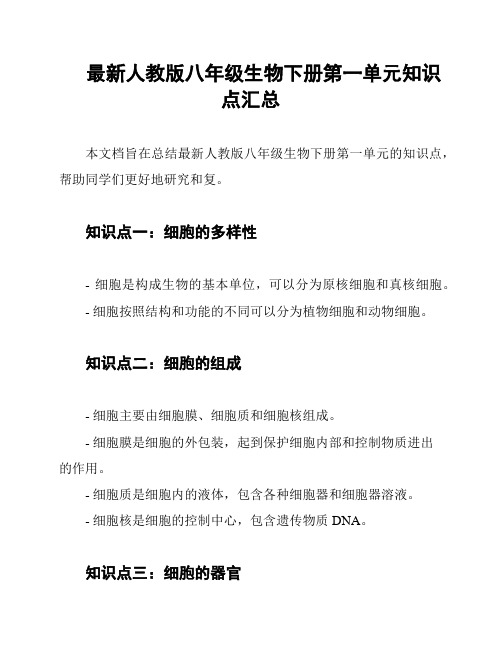
最新人教版八年级生物下册第一单元知识
点汇总
本文档旨在总结最新人教版八年级生物下册第一单元的知识点,帮助同学们更好地研究和复。
知识点一:细胞的多样性
- 细胞是构成生物的基本单位,可以分为原核细胞和真核细胞。
- 细胞按照结构和功能的不同可以分为植物细胞和动物细胞。
知识点二:细胞的组成
- 细胞主要由细胞膜、细胞质和细胞核组成。
- 细胞膜是细胞的外包装,起到保护细胞内部和控制物质进出
的作用。
- 细胞质是细胞内的液体,包含各种细胞器和细胞器溶液。
- 细胞核是细胞的控制中心,包含遗传物质DNA。
知识点三:细胞的器官
- 常见的细胞器有内质网、高尔基体、线粒体、溶酶体和叶绿
体等。
- 内质网主要参与物质的合成和运输。
- 高尔基体参与物质的包装和分泌。
- 线粒体是细胞的能量中心,参与细胞呼吸作用。
- 溶酶体主要参与细胞的消化和储存。
- 叶绿体是植物细胞的特有细胞器,参与光合作用。
知识点四:细胞的生命周期
- 细胞的生命周期包括有丝分裂和减数分裂两个过程。
- 有丝分裂是一种细胞分裂方式,分为四个阶段:前期、中期、后期和末期。
- 减数分裂是用于生殖细胞的分裂方式,分为两个阶段:减数
分裂一和减数分裂二。
以上是对最新人教版八年级生物下册第一单元的知识点汇总。
希望这些内容能帮助同学们更好地理解和掌握生物知识。
人教版八年级英语下册Unit 1 What's the matter 词汇短语知识点总结梳理(共1
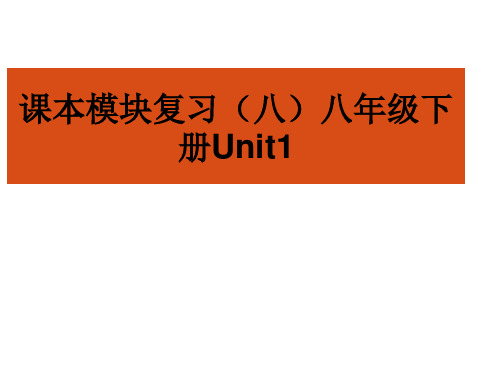
A. what
B. when
C. who
D. how
( D) 2. Please don’t do homework and watch TV_______.
A. from time to time B. all the time
C. at times D. at the same time
课本模块复习(八)八年级下册Unit1
形容词.adj
1.生病的 sick
2.孤单的lonely 3.强壮的strong
4.sore疼痛的
3.trouble问题 4.护士nurse
名词.n
5. rest休息 6.accident意外 7.situation情况 8.decision决定 9.importance重要性
10.death死亡
代词pron
D. provide
课本模块复习(八)八年级下册Unit1
( A) 6. I’ll help ________the city parks on Volunteer Day.
A. clean upB. eat up C. dry up
D. use up
(D) 7. If you like to help the homeless people you can ________food at the food bank.
care for
make see
make sure确定
get up起床
make a face做鬼脸
get
make friends with与…做朋友
make up of构成 make up one's mind下决心
get together聚会 get on with sb与…某人相处 get on上车 get off下车 get down降下
新人教版八年级下册政治知识点总结
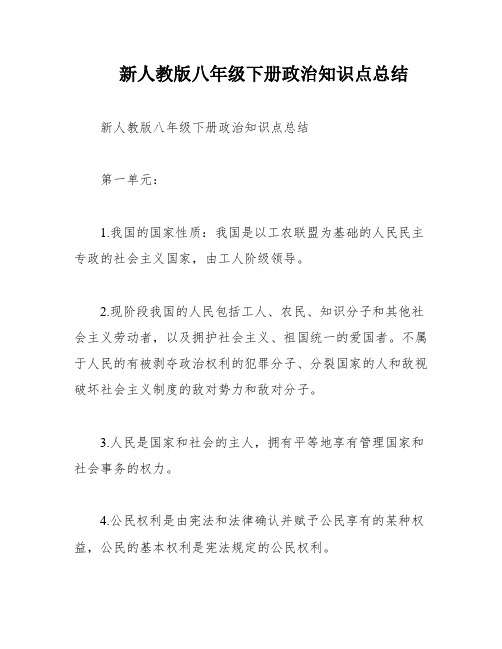
新人教版八年级下册政治知识点总结新人教版八年级下册政治知识点总结第一单元:1.我国的国家性质:我国是以工农联盟为基础的人民民主专政的社会主义国家,由工人阶级领导。
2.现阶段我国的人民包括工人、农民、知识分子和其他社会主义劳动者,以及拥护社会主义、祖国统一的爱国者。
不属于人民的有被剥夺政治权利的犯罪分子、分裂国家的人和敌视破坏社会主义制度的敌对势力和敌对分子。
3.人民是国家和社会的主人,拥有平等地享有管理国家和社会事务的权力。
4.公民权利是由宪法和法律确认并赋予公民享有的某种权益,公民的基本权利是宪法规定的公民权利。
5.人民是政治概念,公民是法律概念,中国公民指具有中国国籍并依据宪法和法律规定,享有权利和承担义务的人。
6.我国建立了以宪法为核心、以立法保障和司法保障为主要内容的权利保障体制,保障公民的权利。
立法保障是将公民的权利以法律的形式确认下来,司法保障是通过法律制裁各种侵权行为,保障公民的权利。
7、公民的基本权利覆盖政治、经济、文化等各个领域,包括平等权、政治权利和自由、宗教自由、人身自由权利等。
宪法是公民基本权利的确认书和保证书,普通法律则根据宪法进一步规定公民的具体权利。
8、公民在行使权利时应该尊重他人权利,不得损害国家、社会、集体的利益,要在法律允许的范围内行使权利,并以合法方式行使权利。
9、在行使的权利时,公民不得利用此来侮辱、诽谤他人,也不得利用此教唆、煽动他人实施危害国家安全、破坏民族团结、破坏社会公德、扰乱社会秩序的行为。
10、我国宪法规定的公民义务是法定义务,也是我国公民的基本义务。
法定义务是指宪法和法律规定的公民必须履行的义务。
11、道德义务是指社会成员依据社会道德规范,自觉自愿地承担对他人、对社会的道德责任。
我国公民必须遵守的基本道德规范有爱国守法、明礼诚信、团结友爱、勤俭自强、敬业奉献。
12、公民必须履行义务,因为我们不能只获得而不付出,不能只享受权利而不履行义务。
在我国,公民的权利和义务具有一致性。
最新人教版八年级下册英语第一单元知识点
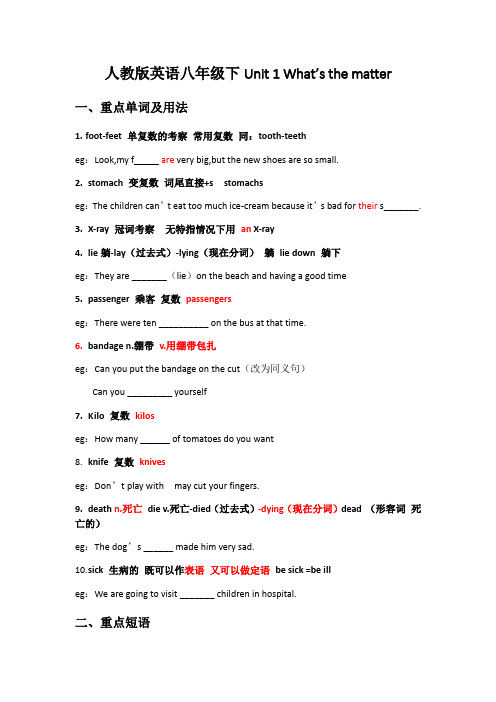
人教版英语八年级下Unit 1 What’s the matter一、重点单词及用法1.foot-feet 单复数的考察常用复数同:tooth-teetheg:Look,my f_____ are very big,but the new shoes are so small.2.stomach 变复数词尾直接+s stomachseg:The children can’t eat too much ice-cream because it’s bad for their s_______.3.X-ray 冠词考察无特指情况下用an X-ray4.lie躺-lay(过去式)-lying(现在分词)躺lie down 躺下eg:They are _______(lie)on the beach and having a good time5.passenger 乘客复数passengerseg:There were ten __________ on the bus at that time.6.bandage n.绷带v.用绷带包扎eg:Can you put the bandage on the cut(改为同义句)Can you _________ yourself7.Kilo 复数kiloseg:How many ______ of tomatoes do you want8.knife 复数kniveseg:Don’t play with may cut your fingers.9.death n.死亡die v.死亡-died(过去式)-dying(现在分词)dead (形容词死亡的)eg:The dog’s ______ made him very sad.10.s ick 生病的既可以作表语又可以做定语be sick =be illeg:We are going to visit _______ children in hospital.二、重点短语have a cold =catch a cold =have the flu 感冒cough 咳嗽lie down 躺下take one’s temperature 量体温have a fever 发烧take/have breaks/a break 休息=take/have a rest get off 下车-get on上车to one’s surprise 令某人惊讶的是right away 立刻马上=right now get into (trouble)陷入(麻烦)get sunburned 被晒伤be used to (doing)习惯于适应于...... take risks/a risk 去冒险run out (of)用完用尽cut off 切除get out of 离开从......出来be in control of 掌管管理give up (doing)放弃(做)某事have a stomachache 胃痛get an X-ray 做一个X射线检查thanks to......由于多亏in time 及时on time 准时think about 考虑think of认为fall down 摔倒make a decision 作决定put......on......把....放在...上be interested in 对...感兴趣三、用法总结1.need to do sth需要做某事eg: The teacher needs_____(rest) for a few minutes.like 意为“听起来像”后接n./adj./句子eg: It sounds like a good idea.类似的感官动词+like:feel like/smell like/ look like/taste like/seem likesound+adj. 结构中,sound 是系动词意为“听起来是”后接形容词eg:That sounds great.+n./doing(v.现在分词)He went to school without having breakfast. eg:He left the classroom without ________ anythingv.同意,赞成agree with sb/某人的意见看法Does she agree with usagree to do sth 同意做某事They agreed to solve the problem. problems (in) doing sth做某事有困难=have trouble/difficulty (in) doinghave problems with sth =have trouble/difficulty with sth 在某方面有困难eg:One of my good friends said he had problems__________(learn) English.get used to doing sth 习惯于做某事eg:He used to get up late,but now he is used to getting up early.used to do sth 过去常常做某事(现在不做了)eg:He used to read English in the evening.use sth to do sth 使用用某物做某事eg:So he used knife to cut off his arm.be used to do sth 被动被用于做某事eg:These new pens are used to paint the wall.one’s life 丧失生命save one’s life 挽救某人的生命eg:He lost his life in the car accident.adj.足够的充足的后接名词n. enough moneyadv.足够地修饰形容词/副词enough要后置eg:The book is_______,but I don’t have enough money ______it.interesting; to buy enough; to buyenough; buying interesting; buying9. the importance of (doing)sth (做)某事的重要性important adj.重要的unimportant adj.不重要的importance n.重要性eg:We students should know the importance of (learning)English.n.决定make a decision (to do sth)decide to do sth 决定做某事decide not to do sth 决定不做某事eg:Tom made a decision to study English well.up 放弃give up 是动词+副词结构接代词作宾语时代词放中间eg:The problem is so difficult for you,but don’t _______A.give it up it out up it out itgive up doing sth 放弃做某事eg:You will be very sad if you give up______(sing).用法keep on doing sth 继续做某事(中间有间隔强调重复性)eg:He kept on studying though he was very tired.keep doing sth 继续不停地做某事(不间断连续性)eg:Keep walking until you reach the end of the road.keep sb doing 让某人一直做某事eg:Don’t keep the other students waiting.keep sb from doing sth 阻止某人做某事eg:We should keep the little boy from stepping on the grass.用法find找到,强调寻找的结果look for强调寻找过程find out找出查明eg:I was looking for my watch,but I didn’t find it.find sb doing sth 发现某人正在做某事eg:When I walked along the road,I found an old man shouting for help.find it +adj形容词+to do sth 发现做某事是...的eg:She found it hard to finish the work by herself.risks=take a risk 冒险He likes taking risks.risk one’s life to do 冒着生命危险去做某事eg:He risked his life to save the child.risk doing stheg: The man called Tom often risks flying over the sea.四、短语辨析1.see sb doing sth 看见某人正在做某事(动作正在发生)see sb do sth 看见某人做某事(看到动作全过程或者经常看到动作发生)eg:I saw the boy crying when I passed by(路过).类似的hear/watch/notice/find+sb do/doing sththanks to 多亏... 由于....=with the help of/with one’s help=because ofthanks for 因.......而感谢强调感谢的原因eg:Thanks to my teacher ,I passed the exam.Thanks for your help .Thanks for inviting me.2.in time 及时表示动作在规定时间内或比规定时间提前发生on time 准时按时指正好在规定时间内eg:Thanks for coming here to help me in time.The train arrived into the station on time.火车准时进站了。
人教版八年级物理下册各单元知识点总结
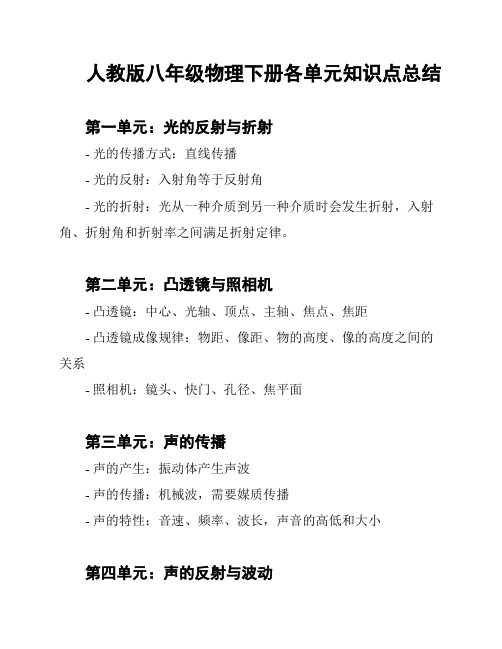
人教版八年级物理下册各单元知识点总结第一单元:光的反射与折射- 光的传播方式:直线传播- 光的反射:入射角等于反射角- 光的折射:光从一种介质到另一种介质时会发生折射,入射角、折射角和折射率之间满足折射定律。
第二单元:凸透镜与照相机- 凸透镜:中心、光轴、顶点、主轴、焦点、焦距- 凸透镜成像规律:物距、像距、物的高度、像的高度之间的关系- 照相机:镜头、快门、孔径、焦平面第三单元:声的传播- 声的产生:振动体产生声波- 声的传播:机械波,需要媒质传播- 声的特性:音速、频率、波长,声音的高低和大小第四单元:声的反射与波动- 声的反射:声波遇到障碍物时发生反射,遵循反射定律- 声的波动:声波的传播是通过气体、液体和固体中的分子振动传递的第五单元:电与磁- 电路中的电流:电荷的流动形成电流- 电路的基本组成:电源、导线和电器- 磁性物质和磁场:磁力线、磁场的概念和表示方法第六单元:电的华尔兹和电解质溶液- 电的华尔兹法则:磁感应强度、导线长度、电流方向之间的关系- 电解质溶液:电解质溶液导电的原理和条件第七单元:电的磁效应- 感生电动势和感生电流:导体在磁场中相对运动会感生电动势和电流- 电感和互感:电感的概念和特性,互感的概念和应用第八单元:电磁感应与电能传输- 安培环路定理和法拉第定律:描述电磁感应现象的定律- 发电机和变压器:电能的转换和传输原理及实际应用第九单元:直流电和电化学- 直流电的基本概念:电流、电压、电阻、电功率- 电化学现象:电解和电镀的原理和实际应用第十单元:利用电和光的现代技术- 电的常用应用:电灯、电铃、电炉等- 光的常用应用:光纤通信、激光器、光电器件等以上是人教版八年级物理下册各单元的知识点总结。
希望对您有帮助!。
人教版八年级英语下册各单元知识点总结完整版

Unit 1 What’s the matter?一、重点短语1. have a fever 发烧2. have a cough 咳嗽3. have a toothache 牙疼4. talk too much 说得太多5. drink enough water 喝足够的水6. have a cold 受凉;感冒7. have a stomachache 胃疼8. have a sore back 背疼9. have a sore throat 喉咙痛10. lie down and rest躺下来休息11. hot tea with honey加蜂蜜的热茶12. see a dentist看牙医13. get an X-ray拍X光片14. take one’ s temperature量体温15. put some medicine on sth在……上面敷药16. feel very hot 感到很热17. sound like 听起来像18. all weekend 整个周末19. in the same way以同样的方式20. go to a doctor 看医生21. go along 沿着……走22. on the side of the road 在马路边23. shout for help 大声呼救24. without thinking twice 没有多想25. get off 下车26. have a heart problem 有心脏病27. to one’ s surprise 使……惊讶的28. thanks to 多亏了;由于29. in time及时30. save a life 挽救生命31. get into trouble 造成麻烦32. right away 立刻;马上33. because of 由于34. get out of 离开35. hurt oneself 受伤36. put a bandage on sth. 用绷带包扎37. fall down 摔倒38. feel sick 感到恶心39. have a nosebleed 流鼻血40. cut his knee割伤他的膝盖41. put her head back 把她的头向后仰42.have problems breathing呼吸困难43. mountain climbing登山运动44. be used to doing sth. 习惯做某事45. run out (of) 用完;用尽46. so that 以便47. so…that 如此……以至于……48. be in control of 掌管;管理49. in a difficult situation 在逆境屮50. keep on doing sth.坚持做某事51. make a decision做出决定52. take risks 冒险53. give up 放弃二、知识点解析1. What’s the matter? 怎么了?若是询问“某人怎么了?”要用“What’s the matter with sb.?”拓展:What’s the matter with sb.? 的同义句:What’s wrong with sb.? / What’s the trouble with sb.?2.疾病类短语:have a +疾病. e.g. :have a fever 发烧have a cold 感冒have a cough 咳嗽.have a +身体部位-ache. e.g.: have a headache 头痛have a toothache 牙痛.have a sore+身体部位. e.g.: have a sore throat咽喉痛have a sore back背痛例题:Mom, I____________.I’m sorry to hear that, dear. We must go to see the dentist right away.A. have a headacheB. have a stomachacheC. have a toothacheD. have a fever3. lie down 躺下V. 躺,平躺。
新人教版英语八年级下册第一单元知识点归纳

【导语】下⾯是为您整理的新⼈教版英语⼋年级下册第⼀单元知识点归纳,仅供⼤家参考。
Unit 1 What’s the matter?⼀、基础知识1. What’ s the matter? 怎么啦?出什么事情了?【解析】matter/ ' mætə(r)) /n.问题;事情What’ s the matter with you?= What’s the trouble with you? = What’ s wrong with you? 你怎么了?【注】: matter 和trouble 为名词,其前可加the 或形容词性物主代词,wrong 是adj. 不能加the【⽤法】⽤于询问某⼈有什么病或某⼈遇到什么⿇烦、问题其后跟询问对象时,与介词with连⽤。
即:What’s the matter with sb.? = What’s your trouble? = What’s up? = What happens to sb.?— What’s the matter with you ? — I have a bad cold.2. I had a cold.我感冒了。
have a cold=catch a cold=have the flu感冒have a fever 发烧 have a cough咳嗽 have a stomachache胃疼,肚⼦疼 have a toothache⽛疼 have a headache头疼3. ⾝体部位+ache(疼痛)构成新的复合词stomach+ache=stomachache head+ache=headache tooth+ache=toothache back+ache=backache后背痛4. much too+ 形容词,意为太...... ,too much+名词,意为很多,⼤量。
5. enough【形容、副词】⾜够的/地,enough放在名前后,形副后。
人教版八年级下册英语知识点总结(最新最全)
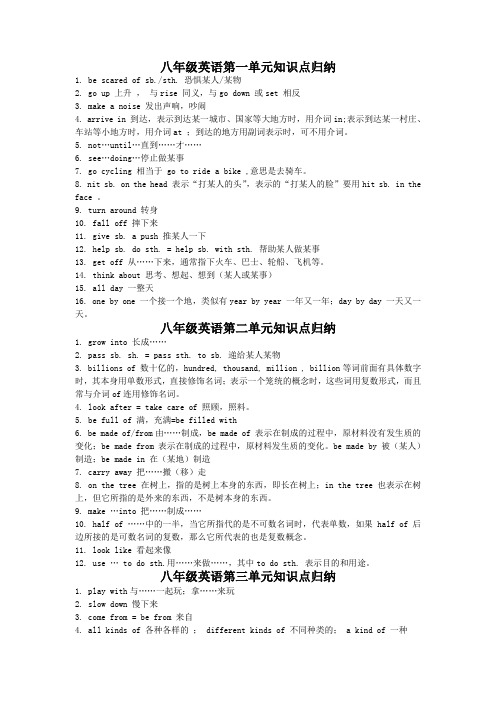
八年级英语第一单元知识点归纳1. be scared of sb./sth. 恐惧某人/某物2. go up 上升,与rise 同义,与go down 或set 相反3. make a noise 发出声响,吵闹4. arrive in 到达,表示到达某一城市、国家等大地方时,用介词in;表示到达某一村庄、车站等小地方时,用介词at ;到达的地方用副词表示时,可不用介词。
5. not…until…直到……才……6. see…doing…停止做某事7. go cycling 相当于 go to ride a bike ,意思是去骑车。
8. nit sb. on the head 表示“打某人的头”,表示的“打某人的脸”要用hit sb. in the face 。
9. turn around 转身10. fall off 摔下来11. give sb. a push 推某人一下12. help sb. do sth. = help sb. with sth. 帮助某人做某事13. get off 从……下来,通常指下火车、巴士、轮船、飞机等。
14. think about 思考、想起、想到(某人或某事)15. all day 一整天16. one by one 一个接一个地,类似有year by year 一年又一年;day by day 一天又一天。
八年级英语第二单元知识点归纳1. grow into 长成……2. pass sb. sh. = pass sth. to sb. 递给某人某物3. billions of 数十亿的,hundred, thousand, million , billion等词前面有具体数字时,其本身用单数形式,直接修饰名词;表示一个笼统的概念时,这些词用复数形式,而且常与介词of连用修饰名词。
4. look after = take care of 照顾,照料。
5. be full of 满,充满=be filled with6. be made of/from由……制成,be made of 表示在制成的过程中,原材料没有发生质的变化;be made from 表示在制成的过程中,原材料发生质的变化。
人教版英语八年级下册unit1单元知识点归纳总结
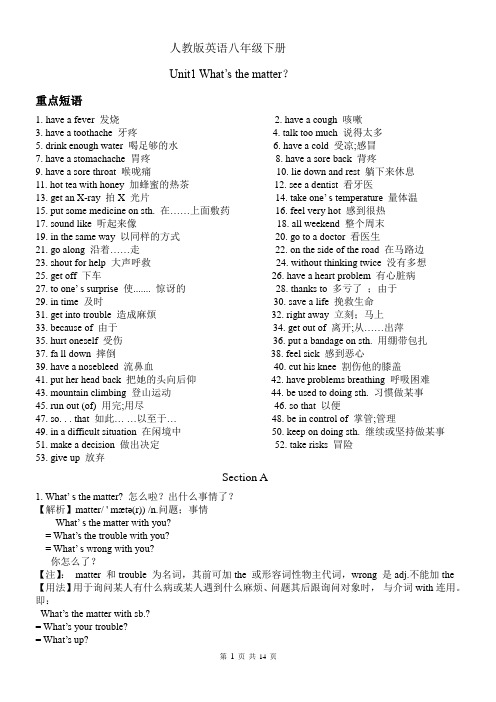
人教版英语八年级下册Unit1 What’s the matter?重点短语1.have a fever 发烧2. have a cough 咳嗽3. have a toothache 牙疼4. talk too much 说得太多5. drink enough water 喝足够的水6. have a cold 受凉;感冒7. have a stomachache 胃疼8. have a sore back 背疼9. have a sore throat 喉咙痛10. lie down and rest 躺下来休息11. hot tea with honey 加蜂蜜的热茶12. see a dentist 看牙医13. get an X-ray 拍X 光片14. take one’ s temperature 量体温15. put some medicine on sth. 在……上面敷药16. feel very hot 感到很热17. sound like 听起来像18. all weekend 整个周末19. in the same way 以同样的方式20. go to a doctor 看医生21. go along 沿着……走22. on the side of the road 在马路边23. shout for help 大声呼救24. without thinking twice 没有多想25. get off 下车26. have a heart problem 有心脏病27. to one’ s surprise 使....... 惊讶的28. thanks to 多亏了;由于29. in time 及时30. save a life 挽救生命31. get into trouble 造成麻烦32. right away 立刻;马上33. because of 由于34. get out of 离开;从……出萍35. hurt oneself 受伤36. put a bandage on sth. 用绷带包扎37. fa ll down 摔倒38. feel sick 感到恶心39. have a nosebleed 流鼻血40. cut his knee 割伤他的膝盖41. put her head back 把她的头向后仰42. have problems breathing 呼吸困难43. mountain climbing 登山运动44. be used to doing sth. 习惯做某事45. run out (of) 用完;用尽46. so that 以便47. so. . . that 如此… …以至于…48. be in control of 掌管;管理49. in a difficult situation 在闲境中50. keep on doing sth. 继续或坚持做某事51. make a decision 做出决定52. take risks 冒险53. give up 放弃Section A1. What’ s the matter? 怎么啦?出什么事情了?【解析】matter/ ' mætə(r)) /n.问题;事情What’ s the matter with you?= What’s the trouble with you?= What’ s wrong with you?你怎么了?【注】:matter 和trouble 为名词,其前可加the 或形容词性物主代词,wrong 是adj.不能加the 【用法】用于询问某人有什么病或某人遇到什么麻烦、问题其后跟询问对象时,与介词with连用。
人教版英语八年级下册第一单元知识点
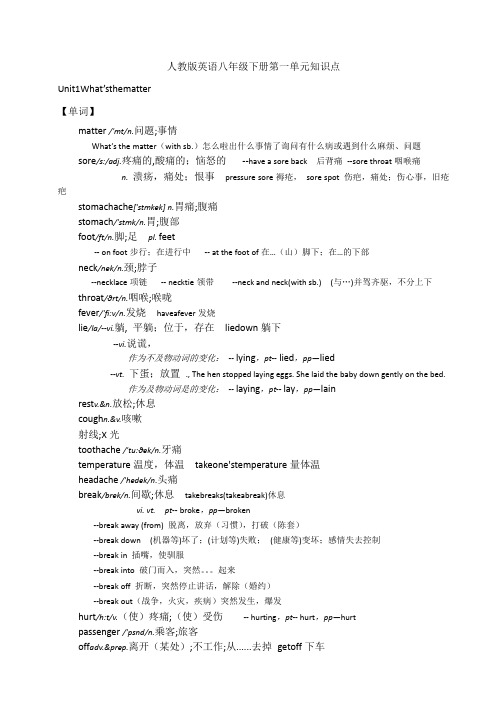
人教版英语八年级下册第一单元知识点Unit1What’sthematter【单词】matter /'mt/n.问题;事情What’s the matter(with sb.)怎么啦出什么事情了询问有什么病或遇到什么麻烦、问题sore/s:/adj.疼痛的,酸痛的;恼怒的--have a sore back 后背痛--sore throat咽喉痛n. 溃疡,痛处;恨事pressure sore褥疮,sore spot 伤疤,痛处;伤心事,旧疮疤stomachache['stmkek] n.胃痛;腹痛stomach/'stmk/n.胃;腹部foot/ft/n.脚;足pl. feet-- on foot步行;在进行中-- at the foot of在…(山)脚下;在…的下部neck/nek/n.颈;脖子--necklace项链-- necktie领带--neck and neck(with sb.) (与…)并驾齐驱,不分上下throat/θrt/n.咽喉;喉咙fever/'fi:v/n.发烧haveafever发烧lie/la/--vi.躺, 平躺;位于,存在liedown躺下--vi.说谎,作为不及物动词的变化:-- lying,pt-- lied,pp—lied--vt. 下蛋;放置., The hen stopped laying eggs. She laid the baby down gently on the bed.作为及物动词是的变化:-- laying,pt-- lay,pp—lainrest v.&n.放松;休息cough n.&v.咳嗽射线;X光toothache /'tu:θek/n.牙痛temperature温度,体温takeone'stemperature量体温headache /'hedek/n.头痛break/brek/n.间歇;休息takebreaks(takeabreak)休息vi. vt.pt--broke,pp—broken--break away (from) 脱离,放弃(习惯),打破(陈套)--break down (机器等)坏了;(计划等)失败;(健康等)变坏;感情失去控制--break in 插嘴,使驯服--break into 破门而入,突然。
八年级下册人教版英语第一单元3a知识点

八年级下册人教版英语第一单元3a知识点在八年级下册人教版英语第一单元3a的学习中,我们需要掌握以下几个知识点:1. 一般现在时态一般现在时态表示经常发生的动作,习惯或者事实。
它的构成是:主语+动词原形(第三人称单数加s)。
例如:He usually goes to school by bus.(他通常乘公交车上学。
)2. 一般过去时态一般过去时态表示过去某个时间发生的动作或者事件。
它的构成是:主语+动词过去式。
例如:I watched TV last night.(我昨晚看电视了。
)3. 句子的基本结构英语句子的基本结构是:主语+谓语+宾语。
其中,主语通常是表示动作的人或物;谓语是说明主语动作或者状态的动词;宾语是接受动作的人或物。
例如:She eats an apple.(她吃了一个苹果。
)4. 形容词和副词的用法形容词用来描述名词或代词的特征或状态,放在名词或代词之前。
例如:The tall boy is my brother.(那个高个子的男孩是我弟弟。
)副词用来描述动词、形容词或其他副词的状态或特征,放在所修饰词的后面。
例如:She sings well.(她唱歌唱得很好。
)5. 物主代词的用法物主代词用来代替名词或代词所表示的人或物的所有格,分为形容词性物主代词和名词性物主代词。
形容词性物主代词用来修饰名词,放在名词之前;名词性物主代词则直接代替名词。
例如:She is my sister.(她是我的妹妹。
)以上就是八年级下册人教版英语第一单元3a知识点的简要介绍,希望能够对同学们的英语学习有所帮助。
当然,光掌握这些知识点还不够,还需要在实际学习和应用中不断去巩固和提高自己的语言技能。
人教版初中英语八年级下册全册各单元知识点、语法归纳整理
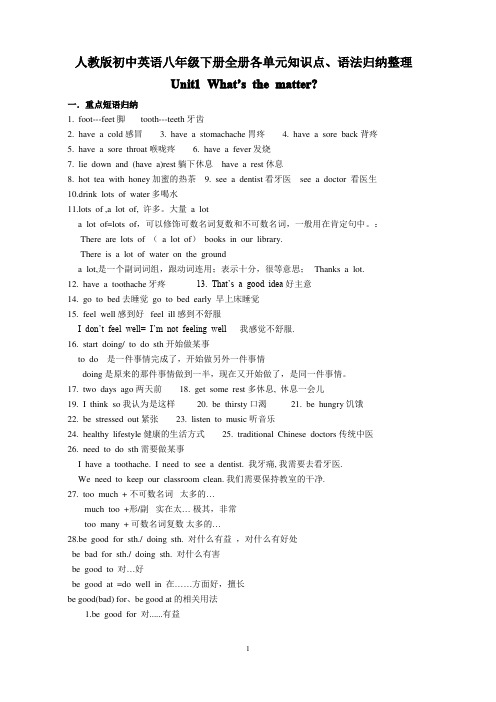
人教版初中英语八年级下册全册各单元知识点、语法归纳整理Unit1W hat’s the matter?一.重点短语归纳1.foot---feet脚tooth---teeth牙齿2.have a cold感冒3.have a stomachache胃疼4.have a sore back背疼5.have a sore throat喉咙疼6.have a fever发烧7.lie down and(have a)rest躺下休息have a rest休息8.hot tea with honey加蜜的热茶9.see a dentist看牙医see a doctor看医生10.drink lots of water多喝水11.lots of ,a lot of,许多。
大量a lota lot of=lots of,可以修饰可数名词复数和不可数名词,一般用在肯定句中。
:There are lots of(a lot of)books in our library.There is a lot of water on the grounda lot,是一个副词词组,跟动词连用;表示十分,很等意思;Thanks a lot.12.have a toothache牙疼13.That’s a good idea好主意14.go to bed去睡觉go to bed early早上床睡觉15.feel well感到好 feel ill感到不舒服I don’t feel well=I’m not feeling well我感觉不舒服.16.start doing/to do sth开始做某事to do是一件事情完成了,开始做另外一件事情doing是原来的那件事情做到一半,现在又开始做了,是同一件事情。
17.two days ago两天前18.get some rest多休息,休息一会儿19.I think so我认为是这样20.be thirsty口渴21.be hungry饥饿22.be stressed out紧张23.listen to music听音乐24.healthy lifestyle健康的生活方式25.traditional Chinese doctors传统中医26.need to do sth需要做某事I have a toothache.I need to see a dentist.我牙痛,我需要去看牙医.We need to keep our classroom clean.我们需要保持教室的干净.27.too much+不可数名词太多的…much too+形/副实在太…极其,非常too many+可数名词复数太多的…28.be good for sth./doing sth.对什么有益,对什么有好处be bad for sth./doing sth.对什么有害be good to对…好be good at=do well in在……方面好,擅长be good(bad) for、be good at的相关用法1.be good for对......有益Doing morning exercises is good for your health.做早操对你们的建康有益。
人教版八年级下册英语第一单元unit1知识点

人教版八年级下册英语第一单元u n i t1知识点(总5页)-本页仅作为预览文档封面,使用时请删除本页-Unit 1 Will people have robots★语法知识归纳一、概念:表示将来某个时间要发生的动作或存在的状态,也表示将来经常或反复发生的动作,常与表示将来的时间状语连用,如tomorrow, next week, next year等。
I will go back to my hometown next week.We will come to see you every Sunday.二、构成1.肯定式:主语+will/shall/be going to +动词原形+其他will:shall:be going to:○They’ll have a test next week.○Shall we have a rest?○I’m going to write a letter to my friend.2.否定式:在will/shall/be后面加notwill+not= shall+not= is+not= are+not=将上面三个肯定句变为否定句○○○3.一般疑问句:将will/shall/be提到主语之前。
将○、○句变为一般疑问句○○★重点句子讲解you think there will be robots in pe ople’s homes?(1)本句是一个_________句,think后面接_________从句,从句的语序必须是_________语序。
引导词_______________________.(2)there will be是there be 句型的一般将来式,否定形式为___________________.一般疑问句形式是 _____________________. be going to 形式为______________________________.翻译:今晚将有一场电影。
人教版八年级生物下册各单元知识点

人教版八年级生物下册各单元知识点第一单元:遗传与变异- 细胞的结构与功能- 遗传与变异的基本概念- 遗传的分子基础- 变异与遗传的关系- 基因的突变与人类常见疾病第二单元:进化论- 进化论的基本概念- 动植物的起源与演化- 人类的起源与演化- 演化过程中的适应与选择第三单元:生殖与发育- 生殖的基本概念- 人类的生殖器官与生殖方式- 人类的生殖调控与计划生育- 胚胎的发育过程与胚胎调控第四单元:基因技术与人类健康- 基因的工程技术与应用- 基因工程的概念与方法- 基因工程在农业和医学中的应用- 基因工程对人类健康的影响与挑战第五单元:生态环境- 生态系统的结构与功能- 生物与环境的相互关系- 生态平衡与生态破坏- 人类活动对生态环境的影响与保护第六单元:细胞的多样性与分化- 细胞的多样性与结构特点- 细胞的多样性与生物多样性的关系- 细胞分化的基本过程与调控- 细胞分化在生物体发育中的作用第七单元:人体免疫系统- 免疫系统的基本概念与组成- 免疫机制与免疫功能- 人体的非特异性防御与特异性免疫- 免疫系统的相关疾病与预防第八单元:人体的调节与控制- 神经调节与内分泌调节的基本概念- 中枢神经系统的结构与功能- 内分泌系统的组成与作用- 受损调节系统的相关疾病与预防第九单元:生物技术的应用与伦理- 生物技术的基本概念与分类- 基因工程技术的应用- 生物技术与社会的关系- 生物技术应用中的伦理与安全问题第十单元:个体与群体的生存- 个体生存与群体生存的基本概念- 个体生命活动与环境条件的关系- 群体与群体之间的相互关系- 个体与群体的生存对策与行为。
人教版八年级下册英语知识点总结

人教版八年级下册英语知识点总结英语知识点Unit 1 What ’s the matter?一、重点短语1. have a fever 发烧2. have a cough 咳嗽3. havea toothache 牙疼 4. talk too much说得太多 5. drink enough water 喝足够的水 6. have a cold 受凉 ; 感冒 7. have astomachache 胃疼 8. have a sore back 背疼 9. have a sore throat 喉咙痛 10. lie downand rest 躺下来休息 11. hot tea w ith honey 加蜂蜜的热茶 12. see a dentist 看牙医13. get an X-ray 拍 X 光片14. take one’ s temperature 量体温 15. put some medicineon sth. 在,, 上面敷药 16. feel very hot 感到很热17. sound like 听起来像 18. allweekend 整个周末 19. in the same way ? 以同样的方式 20. go to a doctor 看医生 21. goalong 沿着,, 走 22. on the side of the road 在马路边 23. shout for help 大声呼救24. without th inking twice 没有多想 25. get off 下车 26. have a heart problem 有心脏病27. to one ’ s surprise 使 [ 京讶的 28. thanks to 多亏了;由于 29. intime 及时 30. save a life 挽救生命 31. get into trouble 造成麻烦 32. right away 立刻;马上 33. because of 由于 34. get out of 离开; 从,, 出萍 35. hurt oneself 受伤36. put a bandage on sth. 用绷带包扎 37. fa ll down 摔倒 38. feel sick 感到恶心 39.have a nosebleed 流鼻血 40. cut his knee 割伤他的膝盖 42. have problems breathing 呼吸困难 43. mountain climbing 登山运动 44. be used to doing sth. 习惯做某事 45. runout (of) 用完 ; 用尽 46. so that 以便 47. so. . . that 如此, , 以至于, 48. be incontrol of 掌管; 管理 49. in a d iffic u lt situation 在闲境屮 50. keep on doing sth.继续或坚持做某事 51. make a decision 做出决定 52. take risks 冒险 53. give up 放弃二、重点句型1. What’ s the matter? What’ s the matter with you? = What’s the trouble with you?= What’ s wrong with you? 你怎么了 2. W hatshould she do? 她该怎么办呢?Should I take my temperature? 我应该量一下体温吗?主语+ should/shouldn ’t + 动词原形. .. ①You should lie down and rest. 你应该躺下休息一会儿。
人教版英语八年级下册第1单元重点知识汇总
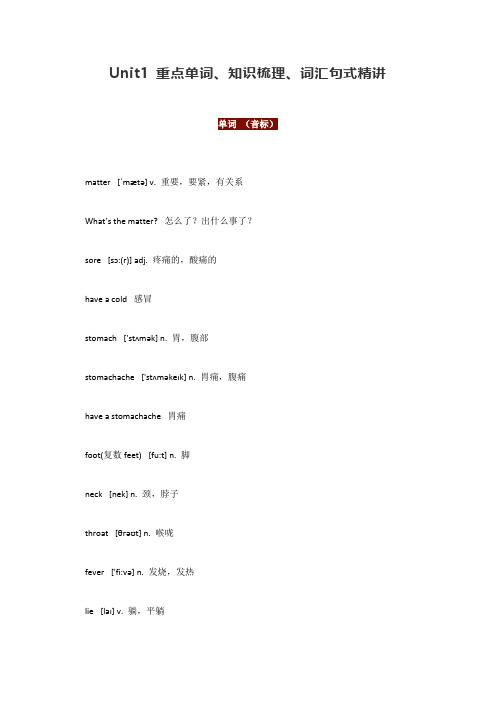
Unit1 重点单词、知识梳理、词汇句式精讲matter [ˈmætə] v. 重要,要紧,有关系What’s the matter? 怎么了?出什么事了?sore [sɔ:(r)] adj. 疼痛的,酸痛的have a cold 感冒stomach ['stʌmək] n. 胃,腹部stomachache ['stʌməkeɪk] n. 胃痛,腹痛have a stomachache 胃痛foot(复数feet) [fu:t] n. 脚neck [nek] n. 颈,脖子throat [θrəʊt] n. 喉咙fever ['fi:və] n. 发烧,发热lie [laɪ] v. 躺,平躺lie down 躺下rest [rest] n. 剩余部分,其余;放松,休息cough [kɒf] n. & v. 咳嗽X-ray ['eksreɪ] n. X光,X射线toothache [ˈtu:θeɪk] n. 牙痛take one's temperature 量体温headache [ˈhedeɪk] n. 头痛have a fever 发烧break [breɪk] n. & v. 休息,暂停;打破take breaks (take a break)休息hurt [hə:t] v. 伤害,损害,使受伤,疼passenger ['pæsɪndʒə] n. 乘客,旅客off [ɒf] adv. prep. 离开(某处);从…去掉get off 下车to one's surprise 使…惊讶,出乎…意料onto [ˈɒntə] prep. 向,朝trouble [ˈtrʌbl] n. 麻烦,烦扰,问题hit [hit] n. & v. 碰撞,打,打击right away 立即,马上get into 陷入,参与herself [hə:ˈself]她自己,她本身(she的反身代词)bandage ['bændɪdʒ] n. & v. 绷带;用绷带包扎sick [sɪk] adj. 患病的,不适的knee [ni:] n. 膝盖nosebleed [ˈnəʊzbli:d] n. 鼻出血breathe [bri:ð] v. 呼吸sunburned [ˈsʌnbɜ:nd] adj. 晒伤的ourselves [ɑ:ˈselvz]我们自己(we的反身代词)climber [ˈklaɪmə(r)] n. 登山者be used to 习惯于… 适应于…risk [rɪsk] n. & v. 风险,危险;冒险take risks (take a risk) 冒险accident [ˈæksidənt] n. 意外事件;事故situation [ˌsitjuˈeiʃən] n. 状况,形式,情况kg=kilogram [ˈkɪləgræm] n. 公斤,千克rock [rɔk] n. 岩石run out (of) 用尽,耗尽knife [naif] n. 刀,餐刀cut off 切除blood [blʌd] n. 血mean [mi:n] v. 意味着,意思是,意欲get out of 离开,从… 出来importance [ɪmˈpɔ:tns] n. 重要性decision [dɪ'sɪʒn] n. 决心,决定,抉择control [kən'trəʊl] v. 控制,支配,操纵be in control of 掌管,管理spirit ['spɪrɪt] n. 勇气,意志death [deθ] n. 死亡give up 放弃nurse [nə:s] n. 护士Judy 朱迪(女名)Nancy 南希(女名)Mandy 曼迪(女名)Aron Ralston 阿伦·罗尔斯顿Utah 尤他州(美国)Unit1 知识梳理【重点单词】matter [ˈmætə] v. 重要,要紧,有关系What’s the matter? 怎么了?出什么事了?sore [sɔ:(r)] adj. 疼痛的,酸痛的have a cold 感冒stomach ['stʌmək] n. 胃,腹部stomachache ['stʌməkeɪk] n. 胃痛,腹痛have a stomachache 胃痛foot(复数feet) [fu:t] n. 脚neck [nek] n. 颈,脖子throat [θrəʊt] n. 喉咙fever ['fi:və] n. 发烧,发热lie [laɪ] v. 躺,平躺lie down 躺下rest [rest] n. 剩余部分,其余;放松,休息cough [kɒf] n. & v. 咳嗽X-ray ['eksreɪ] n. X光,X射线toothache [ˈtu:θeɪk] n. 牙痛take one's temperature 量体温headache [ˈhedeɪk] n. 头痛have a fever 发烧break [breɪk] n. & v. 休息,暂停;打破take breaks (take a break)休息hurt [hə:t] v. 伤害,损害,使受伤passenger ['pæsɪndʒə] n. 乘客,旅客off [ɒf] adv. prep. 离开(某处);从…去掉get off 下车to one's surprise 使…惊讶,出乎…意料onto [ˈɒntə] prep. 向,朝trouble [ˈtrʌbl] n. 麻烦,烦扰,问题hit [hit] n. & v. 碰撞,打,打击right away 立即,马上get into 陷入,参与herself [hə:ˈself] pron. 她自己,她本身(she的反身代词)bandage ['bændɪdʒ] n. & v. 绷带;用绷带包扎sick [sɪk] adj. 患病的,不适的knee [ni:] n. 膝盖nosebleed [ˈnəʊzbli:d] n. 鼻出血breathe [bri:ð] v. 呼吸sunburned [ˈsʌnbɜ:nd] adj. 晒伤的ourselves [ɑ:ˈselvz] pron. 我们自己(we的反身代词)climber [ˈklaɪmə(r)] n. 登山者be used to 习惯于… 适应于…risk [rɪsk] n. & v. 风险,危险;冒险take risks (take a risk) 冒险accident [ˈæksidənt] n. 意外事件;事故situation [ˌsitjuˈeiʃən] n. 状况,形式,情况kg=kilogram [ˈkɪləgræm] n. 公斤,千克rock [rɔk] n. 岩石run out (of) 用尽,耗尽knife [naif] n. 刀,餐刀cut off 切除blood [blʌd] n. 血mean [mi:n] v. 意味着,意思是,意欲get out of 离开,从… 出来importance [ɪmˈpɔ:tns] n. 重要性decision [dɪ'sɪʒn] n. 决心,决定,抉择control [kən'trəʊl] v. 控制,支配,操纵be in control of 掌管,管理spirit ['spɪrɪt] n. 勇气,意志death [deθ] n. 死亡give up 放弃nurse [nə:s] n. 护士【重点短语】1.have a fever 发烧2.have a cough 咳嗽3.have a toothache 牙疼4.talk too much 说得太多5.drink enough water 喝足够的水6.have a cold 受凉;感冒7.have a stomachache 胃疼8.have a sore back 背疼9.have a sore throat 喉咙痛10. take risks 冒险11.hot tea with honey 加蜂蜜的热茶12.see a dentist 看牙医13.get an X-ray 拍X 光片14.take one’ s temperature 量体温15.put some medicine on sth. 在……上面敷药16. give up 放弃17. sound like 听起来像18. all weekend 整个周末19. in the same way 以同样的方式20. go to a doctor 看医生21. go along 沿着……走22. on the side of the road 在马路边23. shout for help 大声呼救24. without thinking twice 没有多想25. get off 下车26. have a heart problem 有心脏病27. to one’ s surprise 另某人惊讶的是28. thanks to 多亏了;由于29. in time 及时30. make a decision 做出决定31. get into trouble 造成麻烦32. right away 立刻;马上33. because of 由于34. get out of 离开;从……出来35. keep on doing sth. 继续或坚持做某事36. put a bandage on sth. 用绷带包扎37. fall down 摔倒38. feel sick 感到恶心39. have a nosebleed 流鼻血40. cut his knee 割伤他的膝盖41. put her head back 把她的头向后仰42. have problems breathing 呼吸困难43. mountain climbing 登山运动44. be used to doing sth. 习惯做某事45. run out (of) 用完;用尽46. so that 以便47. so...that... 如此……以至于...…48. be in control of 掌管;管理49. in a difficult situation 在闲境中【重点句型】1. What's the matter with you?= What'the trouble with you?= What's wrong with you? 你怎么了?2. What should she do? 她该怎么办呢?3.Should I take my temperature? 我应该量一下体温吗?4.You should lie down and rest. 你应该躺下休息一会儿。
- 1、下载文档前请自行甄别文档内容的完整性,平台不提供额外的编辑、内容补充、找答案等附加服务。
- 2、"仅部分预览"的文档,不可在线预览部分如存在完整性等问题,可反馈申请退款(可完整预览的文档不适用该条件!)。
- 3、如文档侵犯您的权益,请联系客服反馈,我们会尽快为您处理(人工客服工作时间:9:00-18:30)。
Unit 1 What’s the matter? 知识点总结一、基本知识点1. What’s the matter (with you)? 怎么了?出什么事了?What’s the trouble/ the problem / wrong with sb./ sth.?2. I had a cold.我感冒了。
have a cold=catch a cold=have the flu have a fever have a cough咳嗽have a stomachache胃疼,肚子疼have a toothache牙疼have a headache头疼3. 身体部位+ache(疼痛)构成新的复合词stomach+ache=stomachache head+ache=headache tooth+ache=toothache back+ache=backache后背痛4. much too+ 词,意为,too much+ 词,意为。
5. enough【形容、副词】足够的/地,enough放在名前后,形副后。
good enough足够好,enough money=money money6. lie down躺下,lie 躺,躺着,过去式lay;lie说谎,过去式lied7. maybe “或许”,常用于句首,表示可能性,后加句子。
Maybe you are right.may be,是情态动词+be的结构,意为“可能,也许”,后加名词、代词或形容词。
He may be angry.8. sound like+名词代词和从句:It sounds like you don’t know the truth. It sounds like a good idea. sound+形容词,“听起来,好像”,The music sounds nice.9. need 需要,实义动词need+名词,需要某物;need to do sth.需要做某事,主语通常是人,表示人主动的动作:You need to listen carefully during class.need doing sth.主语通常是物,表示被动的动作:Your dirty clothes need washing.10. get off (the bus) 下(公交车)get on 上车11. agree 同意,赞同;同意做某事,同意某人的看法、观点12. trouble问题,麻烦;be in trouble ,make trouble ,have trouble (in) doing sth. =have difficulties (in) doing sth 。
13. right away=right now=at once,意为。
14.【复习】advice [不可数名词]劝告,建议,向…征求意见,give sb. advice on sth.就某事给某人建议;advise [动词] advise sb. to do sth. advise doing sth如:He advised going to the movie.他建议去看电影。
He advised us to go to the movie.他建议我们去看电影。
15. 【复习】exercise 动词意为,可数时意为,不可数时意为16. hurt 及物动词,使……疼痛,……受伤,He hurt his leg while exercising.不及物动词,……(部位)疼。
His leg hurt badly.17. clean 【动词】,clean the classroom ,【形容词】,cleaner意为。
18. hit (用手或器具)打;击打The boy hit the dog with a stone.hit sb. on the head/ nose/ back打某人的头、鼻子、后背,on用在所打较硬的部位;hit sb. in the face/ eye/ stomach 打某人的脸、眼睛、肚子,in用在所打较软的部位。
19. be used to sth./ doing sth.习惯于、适应了……、做某事,强调状态;His grandpa was used to country life.Mary is not used to getting up early in the morning.get/ become used to sth./ doing sth. “变得习惯,逐渐适应……”强调过程、动作:It’s difficult for one to get used to another country’s habit.20. 【复习】free [形容词]空闲的free time;免费的the drink is for free;自由的I want to become a free bird.free【动词】使……解脱,得到自由He could not free his arm.21. run out用完,用尽When his water run out, he knew that he would have to do something to save his own life.物sth. tun out. 某物用尽了。
人sb. run out of物sth..人用尽了某物。
He run out of all his money last night.22. risk (sb.) to do sth. 冒险去做某事take a risk=take risks 冒险23. the importance of (doing) sth.(做)某事的重要性We students should know the importance of (learning) English.importance n. 重要(性),important adj.重要的,unimportant adj.24. decision 【名词】决定;抉择;make a decision make a decision to do sth.=25. be in the control of …掌管,管理The headmaster is in the control of this new school.be out of control无法控制,无法管理be under control被控制住,在控制之中26. 【复习】mind意为,mind doing sth. , Would you mind my opening the window?27. give up (doing) sth. 放弃(做)某事,give up (playing) computer games;give up后可接名词、代词和动词ing 形式,也可不接,如Never give up easily.二、重要短语1. have a cold2. have a stomachache3. see sb. do sth.4. shout for help5. expect (sb.) to do sth.6. to one’s surprise7. thanks to …8. think about…9. be interested in sth.10. lose one’s life11. save one’s life12. take a risk=take risks13. cut off14. keep on doing sth三、重点语法【用法】1. 可用作宾语,指的是宾语和主语表示同一个或同一些的人或事物。
如:Maria bought herself a scarf. We must look after ourselves very well.2. 可用作表语,指的是表语和主语表示同一个或同一些人或事物。
如:She isn’t quite herself today.3. 可用作主语或宾语的同位语,常用来加强语气。
如:She herself will fly to London tomorrow. I met the writer himself last week.4. 用在某些固定短语当中。
如:look after oneself / take care of oneself 照顾自己teach oneself sth./ learn sth. by oneself自学enjoy oneself 玩得高兴,过得愉快help oneself to sth 请自用……(随便吃/喝些……).hurt oneself摔伤自己say to oneself自言自语leave sb. by oneself把某人单独留下buy oneself sth.给自己买……东西introduce oneself 介绍……自己【提醒】1. 反身代词不能单独做主语,但可以做主语的同位语,起强调作用。
如:我自己能完成作业。
(误)Myself can finish my homework. (正) I myself can finish my homework. / I can finish my homework myself.2. 反身代词表示“某人自己”不能表示“某人的东西”,因为它没有所有格的形式。
表达“某人自己的(东西)”时,须要用one’s own.如:我用我自己的蜡笔画画。
(误)I’m drawing with myself crayons. (正) I’m drawing with my own crayons.【练习】1. My classmate, Li Ming, made a card for _________ just now.2. Bad luck! I cut _________ with a knife yesterday.3. They tell us they can look after_________ very well.4. My cat can find food by_________ .5. Help __________to some beef, boys.6. Jenny enjoyed_________ in the park yesterday afternoon.7. We can finish our homework by_________ .8. The blind girl lost_________ in the beautiful music.9. Xiao Hui, can you introduce _________ to us ?10. Bill wants to teach_________ French from now on.。
